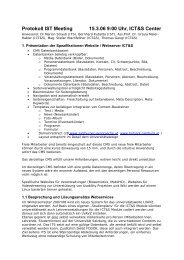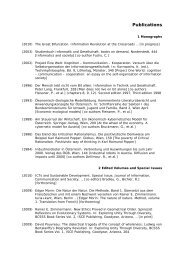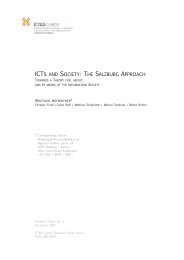CHRISTIAN FUCHS - ICT&S - Universität Salzburg
CHRISTIAN FUCHS - ICT&S - Universität Salzburg
CHRISTIAN FUCHS - ICT&S - Universität Salzburg
Create successful ePaper yourself
Turn your PDF publications into a flip-book with our unique Google optimized e-Paper software.
Christian Fuchs: Social Networking Sites and the Surveillance SocietyOne can either define surveillance as a neutral term or as a term that signifies acoercive process that always is embedded into dominative systems. The first definition,as chosen by e.g. Giddens, Haggerty, or Albrechtslund, poses the danger thatdevelopments such as limitations of basic freedoms by state or corporate surveillanceare put on the same level with information gathering strategies that do not coercepeople or threaten their privacy and freedoms so that developments into the firstdirection can no longer be adequately criticized. Therefore we have chosen to definesurveillance as a critical concept that allows us to question coercive forms ofinformation gathering.Electronic surveillance by nation states and corporations aims at controlling thebehaviour of individuals and groups, i.e. they should be forced to behave or not behavein certain ways because they know that their appearance, movements, location, orideas are or could be watched by electronic systems. In the case of political electronicsurveillance, individuals are threatened by the potential exercise of organized violence(of the law) if they behave in certain ways that are undesired, but watched by politicalactors (such as secret services or the police). In the case of economic electronicsurveillance, individuals are threatened by the violence of capital and the market thatwants to force them to buy or produce certain commodities and help reproducecapitalist relations by gathering and using information on their economic behaviourwith the help of electronic systems. In such forms of surveillance violence andheteronomy are the ultimo ratio, whereas in private forms of displaying oneself on theInternet violence in most cases does not play an important role. In the second case theindividuals being watched agree to it and control surveillance technologies themselves,in the first case they do not and in most cases they do not even know that they areunder surveillance. Hence I would distinguish between electronic monitoring as ageneral notion of providing and gathering information with the help of electronicsystems and electronic surveillance as the gathering of information on individuals orgroups in order to control their behaviour by threatening the exercise ofinstitutionalized violence or exercising economic violence. We agree with Ogura(2006) that a common characteristic of surveillance is the management of populationbased on capitalism and/or the nation state.David Lyon (2003, 5; cf. also 2001, 2, 16) defines surveillance as “routine ways inwhich focused attention is paid to personal details by organizations that want toinfluence, manage, or control certain persons or population groups“. Although Lyondoes not speak of surveillance as form of violence, coercion is an immanent aspect ofhis notion of surveillance. Surveillance means the collection of data on individuals orgroups that are used to control and discipline behaviour by the threat of being targetedby violence. Surveillance operates with uncertainty, invisibility, and psychologicalthreats. Foucault (1977) has stressed that discipline and potential punishment areimportant aspects of surveillance in the sense that the latter aims at the control andsubjugation of bodily movements. One can add that besides behaviour also mentalactivity and communication shall be controlled by surveillance.Surveillance is an expression of instrumental reason and competition because it isbased on the idea that others are watched and data on their behaviour, ideas, look, etc.are gathered so that they can be controlled and disciplined and choose certain actions24









